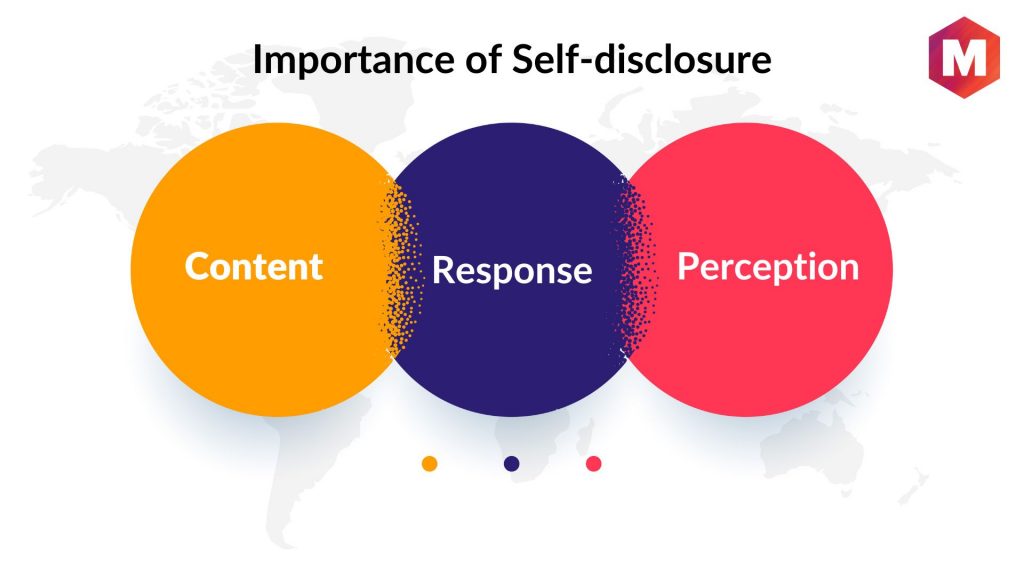
What is Self-Disclosure and Its Various Forms?

Self-disclosure is the act of sharing personal information with others This can strengthen relationships and build trust There are different types of self-disclosure and various factors that can influence it, including personality and social comparison It can have both advantages and limitations, but overall, self-disclosure is important for communication and building connections with others
Self-disclosure is a powerful tool in building intimate connections with others by sharing personal and confidential information. While basic information about individuals is already known, self-disclosure involves revealing deeper, more personal information that is not easily accessible. Typically, self-disclosure occurs in face-to-face interactions and involves sharing thoughts, feelings, and memories that are not typically shared with others. However, it is important to note that self-disclosure is not simply stating basic facts about oneself, but instead involves sharing more intimate details after a high level of trust has been established.
Self-disclosure is a powerful tool that can either enhance or harm personal relationships. When used appropriately, it can foster trust and intimacy between individuals, allowing for deeper connections to form. However, if misused, self-disclosure can have negative consequences that may damage positive relationships.
There are primarily two types of self-disclosures:
Verbal self-disclosure refers to the act of sharing personal information about oneself through spoken words. This can include expressing thoughts, emotions, and confidential details about one's life. On the other hand, non-verbal self-disclosure occurs through body language, gestures, clothing choices, piercings, jewelry, and other subtle cues that may reveal aspects of a person's personality. It should be noted that non-verbal self-disclosure can sometimes occur unintentionally.
Importance of Self-disclosure
The significance of disclosure lies in the quality of information shared, rather than the quantity. Mere superficial details such as favorite movies or restaurants do not constitute true self-disclosure, as they do not establish a deep connection with others. Such information is considered superficial self-disclosure. In contrast, sharing personal details like drug use, infidelity or hacking into a government website can be seen as more intimate self-disclosure.
Superficial self-disclosure may still hold significance in building relationships, as it often serves as a starting point for therapists to gradually delve into more personal and intimate aspects. However, reciprocal disclosure is crucial for effective communication. While there may be instances where one party has nothing to disclose immediately, it is important for the other person to reciprocate in order to establish trust and deepen the relationship.
The nature of your self-disclosure, specifically the inclusion of personal thoughts, emotions, and desires, is crucial in determining the level of intimacy achieved. Factual disclosures may not necessarily create the same level of intimacy as those that delve into one's innermost thoughts and feelings.
Partner's reaction to disclosure plays a crucial role in facilitating effective communication and intimacy. A supportive and close partner can create a safe space for sharing personal information. Additionally, an individual's perception of their partner's behavior also impacts the level of intimacy in the interaction. Understanding and supportive partners can increase privacy and foster a deeper connection.
Expressing oneself openly and honestly through self-disclosure is essential for building deep and meaningful relationships. When individuals share personal information with each other, they are seeking acceptance and validation from their partner. However, it is important to note that the way in which self-disclosure is done can greatly impact the success of the relationship. Superficial self-disclosures may not lead to the same level of satisfaction as more profound self-disclosures that foster a sense of mutual respect and understanding. On the other hand, keeping secrets can be detrimental to a relationship if the motives behind it are negative. In situations where verbal communication is not possible, individuals can still express themselves through nonverbal cues. Ultimately, self-disclosure is vital for maintaining both physical and mental health in a relationship.
Factors influencing Self-disclosure
Multiple factors that can impact the process of self-disclosure:
1. Personality
Individuals' personality traits are significant factors in self-disclosure. One's talkative nature is often used to determine whether they are an introvert or extrovert. Extroverts tend to have no trouble with self-disclosure, whereas introverts are typically more reserved and require time to open up. They prefer to hold back and only share personal information when they feel at ease with others. Compared to extroverts, introverts find it more challenging to rely on others and tend to take longer to share personal information.
Only a very few people are let in the circle of introverts. Thus personality makes a lot of impact on the process of self-disclosure.
2. Mood
A person's mood refers to the emotional state they are experiencing at a given moment. It's known to vary greatly and can have a significant impact on their willingness to disclose personal information. When feeling upset or down, self-esteem may suffer, making it harder to open up. On the other hand, a positive and upbeat mood can create a sense of confidence and optimism, encouraging greater self-disclosure. Conversely, a negative mood can hinder self-disclosure or, at best, lead to surface-level sharing.
3. Loneliness
Loneliness can impact how much individuals are willing to disclose about themselves. Those who are more sociable and less lonely may feel more comfortable sharing personal information, while lonely individuals may prefer to keep to themselves.
Being lonely often leads to reduced communication and decreased trust in others, causing a decline in the sharing of personal information. If a person who is accustomed to solitude is suddenly thrust into a social setting, they may feel even more isolated, hindering their ability to open up. While loneliness may be associated with introversion in certain areas of psychology, such generalizations cannot be made in social psychology.
4. Social comparison
Social comparison is comparing yourself to other people. Most people have a habit of measuring themselves and comparing themselves to other people.
People often feel more comfortable sharing personal information when they believe they are doing better than others. This can include sharing skills, knowledge, personal experiences, and more.
5. Other factors
Various factors can impact the self-disclosure process, including fear, anger, social context, group size, personal history, and physical or technological barriers. These factors can hinder the therapeutic benefits of self-disclosure. For instance, if an individual intends to disclose personal information over the phone but experiences frequent call drops, they may choose to withhold information altogether.
A self-disclosure may not happen between two people if multiple people are present listening to their conversation.
Self-disclosure is an exchange process
Self-disclosure is a common way for individuals to exchange information with one another. However, the process of self-disclosure is influenced by the level of relationship between individuals.
As relationships age, self-disclosure tends to deepen the connection between individuals. However, the impact of self-disclosure on relationships is not always positive. If used inappropriately, self-disclosure can actually harm relationships rather than strengthen them. Overall, self-disclosure can be a powerful tool for building understanding and fostering long-term connections between people.
Personal revelations or self-disclosure can often backfire. Sharing too much on social media platforms like Facebook or Instagram may not be well-received by everyone, as not everyone may understand the context or relevance of your disclosure. It's important to consider your audience and the purpose of your self-disclosure before sharing it with the world.
Influence of Self-disclosure on a relation
Sharing personal information is a crucial aspect of building relationships, as it can serve as a foundation for trust and intimacy. However, it is important to be mindful of the level of disclosure that occurs, as sharing too much or too little can negatively impact the relationship. In the early stages of a relationship, individuals may be hesitant to share personal details until a sense of trust and comfort has been established.
Gender and individual differences in self-disclosure
It is commonly believed that men are less expressive than women, leading to the expectation that women should be more outwardly emotional. However, when men do express themselves, they may be perceived as unstable, while women who are less expressive are not viewed as abnormal. Interestingly, studies have found that women tend to disclose more personal information to other women than to men. This may be due to the fact that women are better at both expressing themselves and listening attentively, allowing for more meaningful conversations and emotional support.
Sharing personal information is essential in building and maintaining romantic relationships. Open and honest self-disclosure is now considered a common practice, as it helps to establish mutual respect and trust between individuals. However, some may find self-disclosure daunting, leading to feelings of regret. Consequently, many individuals opt not to reveal personal details due to the fear of rejection.
Advantages
Self-disclosure can be a powerful tool for resolving conflicts within teams. Since conflicts can hinder team development, addressing them early on with self-disclosure can lead to more productive teams and better relationships with colleagues and customers.
When you open up and share personal information with someone, it establishes a sense of trust and creates a more comfortable environment. This is especially important in leadership roles, where authenticity is key. Those who are open and honest about themselves are often viewed as trustworthy by others. Additionally, a workplace where self-disclosure is encouraged can lead to increased productivity and enjoyment in the job.
Imitations
In the world of social media, it is crucial to understand the balance between sharing enough information to gain trust and not oversharing to the point of vulnerability. Sharing more than necessary can actually harm your reputation and lead to negative consequences. Therefore, it is essential to be mindful of what we share and how much we share.
The response to self-disclosure is highly dependent on the individual and can be quite unpredictable. One must be prepared for a range of reactions, from embarrassment and surprise to laughter or no reaction at all. It is important to remember that self-reputation is a delicate matter and sharing personal information with the wrong person can have negative consequences, potentially causing harm to both yourself and others.
Conclusion
In building relationships, self-disclosure plays a vital role in facilitating the exchange of information between individuals. However, it is crucial to know how to conduct self-disclosure properly and to understand what information to share and when to share it. The quality of self-disclosure is far more important than the quantity of information shared.
FRAGMENT:
It’s important to set boundaries and protect yourself from those who may take advantage of your vulnerabilities. Don’t feel obligated to share everything about yourself just because someone else is sharing with you. Trust is earned and should not be freely given to those who have not shown themselves worthy of it. Remember that your personal information is valuable and should be treated as such.
Communication Models


















